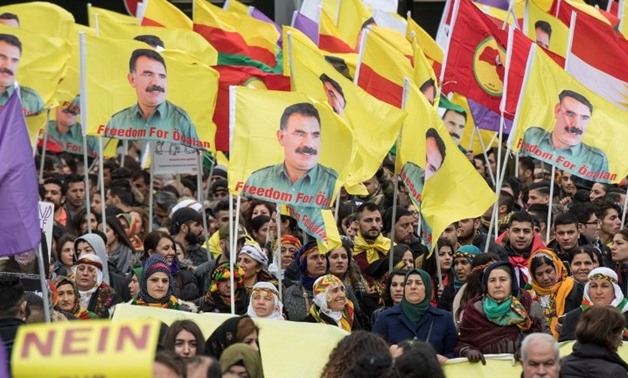
Kurdish protesters demonstrate with placards reading "No to dictatorship" and the portrait of the leader of the Kurdistan PKK Workers' Party, Abdullah Ocalan in the city center of Frankfurt am Main, western Germany, on March 18, 2017. (AFP Photo/dpa/Boris
ISTANBUL - 27 May 2018: The Turkish Foreign Ministry on Saturday condemned as a "double standard" a decision by Germany to allow a rally by the pro-Kurdish opposition HDP party in Cologne, having previously prevented ruling party politicians from campaigning there.
"This two-faced approach, which we condemn strongly, cannot be reconciled with democracy, the fight against terrorism and expectations of a normalisation in Turkish-German relations," the ministry statement said.
Germany, home to about three million people of Turkish origin, has said it will not allow foreign politicians to campaign on its territory ahead of Turkey's June 24 presidential and parliamentary elections.
The election will see the switch to a powerful executive presidential system that was narrowly approved in a referendum last year.
Police in Cologne banned two Turkish opposition politicians from speaking at a demonstration of Kurds in the city on Saturday out of fear that the politicians might use the opportunity to campaign in the Turkish elections, the Rheinische Post newspaper reported.
The paper reported that Ahmet Yildirim and Tugba Hezer, lawmakers from the HDP party, had hoped to speak at the demonstration, being held by the city’s Kurds to protest against Turkey’s involvement in the Syrian conflict.
Austrian Chancellor Sebastian Kurz, who heads a right-wing coalition opposed to Turkey joining the European Union, also said last month Erdogan would be barred from "trying to exploit" Europe's Turkish communities.
Thousands of expatriate Turks from Germany, the Netherlands and Austria and across the Balkans attended a rally held by President Tayyip Erdogan in Bosnia last week.
During his speech, Erdogan took a swipe at European countries that refused to let him campaign on their territory.
Ahead of the 2017 referendum, ministers travelled to countries with big Turkish communities -- including Germany and the Netherlands -- to urge support for the change, but were stopped from campaigning by authorities citing security fears.
The most popular -- and divisive -- politician in recent Turkish history, Erdogan has ruled for 15 years, overseeing a period of rapid economic growth. But a widespread crackdown against his opponents has led rights groups and Western allies of the NATO member to voice concerns about Turkey's record on civil rights and Erdogan's growing authoritarianism.

Comments
Leave a Comment